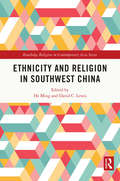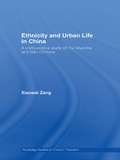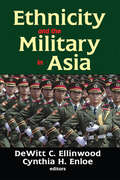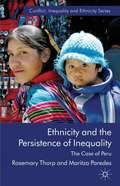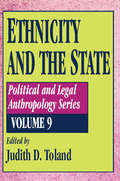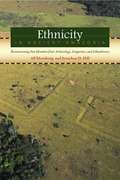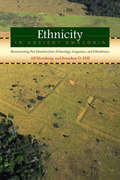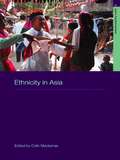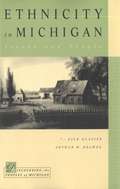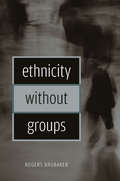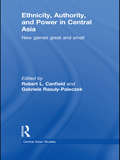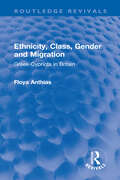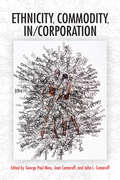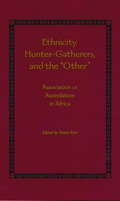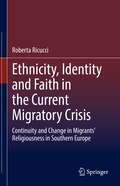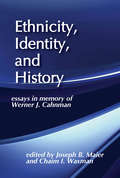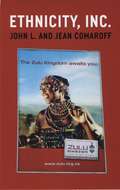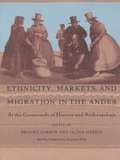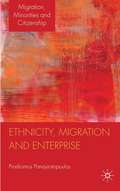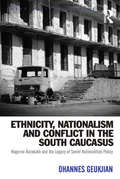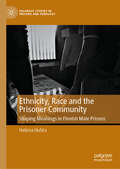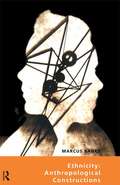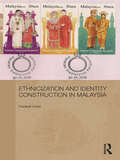- Table View
- List View
Ethnicity and Religion in Southwest China (Routledge Religion in Contemporary Asia Series)
by David C. Lewis He MingAs China strengthens its links with its neighbours through its Belt and Road initiative, there is growing interest in the indigenous peoples of China’s western and southwestern borderlands. This book, based on extensive original research, considers the indigenous peoples of Yunnan province, which is a major gateway between China and the countries of south and south-east Asia. Unlike many books on China’s indigenous peoples which are written by foreigners who have lived for a while in China, this book is comprised of the work of Chinese scholars, many of them members of ethnic minorities themselves, and considers the issues from a Chinese perspective.
Ethnicity and Urban Life in China: A Comparative Study of Hui Muslims and Han Chinese (Routledge Studies on China in Transition #7)
by Xiaowei ZangThis much-needed work on ethnicity in Asia offers a major sociological analysis of Hui Muslims in contemporary China. Using both qualitative and quantitative data derived from fieldwork in Lanzhou between March 2001 and July 2004, it looks at the contrast between the urban life of the Han people, the ethnic majority in the city of Lanzhou, and the Hui people, the largest ethnic minority in the city, and assesses the link between minority ethnicity and traditional behaviour in urban sociology and research on ethnic groups of China. In-depth interviews and survey data provides a fresh perspective to the study of ethnic behaviour in China, and offers a rich account of Hui behaviour in seven aspects of urban life: neighbouring interaction, friendship formation, network behaviour, mate selection methods, spouse choice, marital homogamy, and household structure. Contributing to the global discourse on Islam, religious fundamentalism and modernity, this book will be invaluable to anyone interested in Chinese society, Islam, religion, development, urban studies, anthropology and ethnicity.
Ethnicity and the Dementias
by Gwen Yeo Delores Gallagher-ThompsonIn recent years, the literature on the topic of ethnic and racial issues in Alzheimer’s disease and other dementias has increased dramatically. At the same time, the need for cultural competence in all of geriatric care, including dementia care, is increasingly being acknowledged. Researchers and providers are beginning to recognize the impending "ethnogeriatric imperative," as the number of elders from diverse ethnic and cultural backgrounds continues to rise. Ethnicity and the Dementias offers invaluable background information in this area, while also examining how those suffering from dementia and their family members respond or adapt to the challenges that follow. Thoroughly updated and revised from the first edition, the book features contributions from leading clinicians and researchers on the epidemiology of dementias by ethnic population, new information on the assessment of diverse populations, and updates and inclusions of new populations in the management of dementia and working with families. The book is ideal for practitioners, researchers, and policy makers in search of the most current ethnogeriatric findings.
Ethnicity and the Military in Asia
by DeWitt C. Ellinwood and Cynthia H. EnloeThis volume examines ethnicity in relation to one major facet of Asian life—the military. Ethnicity, now being studied on a variety of scholarly and geographical fronts, is a fruitful topic for consideration in the study of the relationships between the Asian armed forces and their governments and societies. While Ethnicity and the Military of Asia profits from recent explorations of ethnicity, it also benefits from the current interest in a close scholarly examination of the relationship between armed forces, war, and society.Since the military institutions of so many Asian societies have played or are playing leading roles in their country's government, the military has a relationship, often ambiguous, to the development of the expression of nationhood—a central factor in the new states of Asia. This study shows that policies concerning the military have importance for intergroup relations by expressing policies on ethnicity and by modifying relations between ethnic groups. One factor that correlates with this is that policy concerning membership in the military has a relationship to the search for "modernization" and to social mobility.
Ethnicity and the Persistence of Inequality
by Rosemary Thorp Maritza ParedesUnderstanding why inequality is so great and has persevered for centuries in a number of Latin American countries requires tools that go beyond economics. Investigating the case of Peru, this book explores how inequality is embedded in institutions that constitute the interface between the economy, the polity and geography of the country.
Ethnicity and the State (Political And Legal Anthropology Ser. #Vol. 9)
by Judith D. TolandModern states have evolved as complex political structures in which unitary forms of government maintain an uncertain equilibrium with ethnically plural societies. Historically, ruling elites have tried with little success to eradicate ethnicity through genocide, bury it under accusations of tribalism, discredit it with the mind-frame of modernization, or confine it to local rather than national political arenas. This broad-ranging volume examines the dynamics of ethnic manipulation and accommodation by dominant and subordinate groups in the state-building process.Ethnicity and the State reflects the widely varying political contexts and cultures in which reasons of state contend with unyielding ethnic allegiances. European, South American, Asian, and Middle Eastern examples reveal a consistent set of themes and attitudes. The authors find that while the state must realize its authority and stability through a strictly defined charter of rights and values, ethnic identity exercises its power more freely and flexibly. The sense of peoplehood may be artificially constructed in response to immediate need, or it may be ancient and organic, growing over time. It has the potential to cut across race, class, and gender. Its central tenets and myths may be reinterpreted, recreated, enlarged upon, or modified as the political situation warrants. Flexibility of belief and the need to identify with a larger group account both for the durability of ethnic loyalty and its vulnerability to manipulation.This volume is particularly timely at a moment when national governments in many parts of the world must face the adoption of more equitable forms of rule to hold their ethnically diverse societies together. Taken together, the analyses presented here warn against institutionalizing ethnic strife and offer a vision of how the state may foster expectations and policies that serve the interests of all ethnic groups within their borders. Political scientists, historians, and anthropologists will find this book valuable for its interpretations of forces that continue to reshape the social and political fabric of the world.
Ethnicity in Ancient Amazonia
by Alf Hornborg Jonathan D. Hill"A major contribution to Amazonian anthropology, and possibly a direction changer." -J. Scott Raymond,University of Calgary A transdisciplinary collaboration among ethnologists, linguists, and archaeologists, Ethnicity in Ancient Amazonia traces the emergence, expansion, and decline of cultural identities in indigenous Amazonia. Hornborg and Hill argue that the tendency to link language, culture, and biology--essentialist notions of ethnic identities--is a Eurocentric bias that has characterized largely inaccurate explanations of the distribution of ethnic groups and languages in Amazonia. The evidence, however, suggests a much more fluid relationship among geography, language use, ethnic identity, and genetics. In Ethnicity in Ancient Amazonia, leading linguists, ethnographers, ethnohistorians, and archaeologists interpret their research from a unique nonessentialist perspective to form a more accurate picture of the ethnolinguistic diversity in this area. Revealing how ethnic identity construction is constantly in flux, contributors show how such processes can be traced through different ethnic markers such as pottery styles and languages. Scholars and students studying lowland South America will be especially interested, as will anthropologists intrigued by its cutting-edge, interdisciplinary approach.
Ethnicity in Ancient Amazonia: Reconstructing Past Identities from Archaeology, Linguistics, and Ethnohistory
by Alf Hornborg Jonathan D. HillA transdisciplinary collaboration among ethnologists, linguists, and archaeologists, Ethnicity in Ancient Amazonia traces the emergence, expansion, and decline of cultural identities in indigenous Amazonia. Hornborg and Hill argue that the tendency to link language, culture, and biology--essentialist notions of ethnic identities--is a Eurocentric bias that has characterized largely inaccurate explanations of the distribution of ethnic groups and languages in Amazonia. The evidence, however, suggests a much more fluid relationship among geography, language use, ethnic identity, and genetics. In Ethnicity in Ancient Amazonia, leading linguists, ethnographers, ethnohistorians, and archaeologists interpret their research from a unique nonessentialist perspective to form a more accurate picture of the ethnolinguistic diversity in this area. Revealing how ethnic identity construction is constantly in flux, contributors show how such processes can be traced through different ethnic markers such as pottery styles and languages. Scholars and students studying lowland South America will be especially interested, as will anthropologists intrigued by its cutting-edge, interdisciplinary approach.
Ethnicity in Asia
by Colin MackerrasThis book is designed as a comprehensive comparative introduction to ethnicity in East and Southeast Asia since 1945. Each chapter covers a particular country looking at such core issues as:· the ethnic minorities or groups in the country of concern, how many ethnic groups, population, language and culture group they belong to, traditional religions and arts· government policy towards the ethnic minorities or groups · the economies of the ethnic minorities or groups and the relation with the national economy;· problems of national integration caused by the ethnic minorities or groups;· the impact of ethnic issues on the country's overall foreign relations.
Ethnicity in Michigan: Issues and People
by Jack Glazier Arthur W. HelwegAt a time of heightened consciousness about ethnicity, the publication of a series of small volumes on the many ethnic groups that have helped shape the history of a culturally diverse state such as Michigan is altogether fitting.
Ethnicity without Groups
by Rogers Brubaker"Despite a quarter-century of constructivist theorizing in the social sciences and humanities, ethnic groups continue to be conceived as entities and cast as actors. Journalists, policymakers, and researchers routinely frame accounts of ethnic, racial, and national conflict as the struggles of internally homogeneous, externally bounded ethnic groups, races, and nations. In doing so, they unwittingly adopt the language of participants in such struggles, and contribute to the reification of ethnic groups. In this timely and provocative volume, Rogers Brubaker—well known for his work on immigration, citizenship, and nationalism—challenges this pervasive and commonsense “groupism.” But he does not simply revert to standard constructivist tropes about the fluidity and multiplicity of identity. Once a bracing challenge to conventional wisdom, constructivism has grown complacent, even cliched. That ethnicity is constructed is commonplace; this volume provides new insights into how it is constructed. By shifting the analytical focus from identity to identifications, from groups as entities to group-making projects, from shared culture to categorization, from substance to process, Brubaker shows that ethnicity, race, and nation are not things in the world but perspectives on the world: ways of seeing, interpreting, and representing the social world."
Ethnicity, Authority, and Power in Central Asia: New Games Great and Small (Central Asian Studies)
by Robert L. CanfieldThe peoples of Greater Central Asia – not only Inner Asian states of Soviet Union but also those who share similar heritages in adjacent countries like Afghanistan and Pakistan, Iran, and the Chinese province of Xinjiang – have been drawn into more direct and immediate contact since the Soviet collapse. Infrastructural improvements, and the race by the great powers for access to the region’s vital natural resources, have allowed these peoples to develop closer ties with each other and the wider world, creating new interdependencies, and fresh opportunities for interaction and the exercise of influence. They are being integrated into a new, wider economic and political region which is increasingly significant in world affairs, owing to its strategically central location, and its complex and uncertain politics. However, most of its inhabitants are pre-eminently concerned with familial and local affairs. This work examines the viewpoints and concerns of a selection of groups in terms of four issues: government repression, ethnic group perspectives, devices of mutual support, and informal grounds of authority and influence. Responding to a need for in-depth studies concerning the social structures and practices in the region, the book examines trends and issues from the point of view of scholars who have lived and worked "on the ground" and have sought to understand the conditions and concerns of people in rural as well as urban settings. It provides a distinctive and timely perspective on this vital part of the world.
Ethnicity, Class, Gender and Migration: Greek-Cypriots in Britain (Routledge Revivals)
by Floya AnthiasOriginally published in 1992, this book places Cypriot migration to Britain within the context of New Commonwealth migration as a whole and within developments in the field of racial and ethnic relations. It provides an account of the economic and social position of Cypriots in British society, paying particular attention to a number of central theoretical and political debates relating to class, ethnicity, racism and gender. The book argues that migrant groups have to be understood in terms of the interaction between the internal cultural and social differentiations within the group and the wider structural, institutional and ideological processes of the country of migration. Gender divisions and the family are seen as central in understanding the forms of settlement and the economic and social placement of a migrant group.
Ethnicity, Class, and the Indigenous Struggle for Land in Guerrero, Mexico (Native Americans: Interdisciplinary Perspectives)
by Norberto ValdezThis study focuses on Amuzgo Indian communities of the Costa Chica of Guerrero state in Mexico in order to analyze the indigenous struggle for land and its relationship to ethnic identity and culture. Primary archival data and field research reveal a historical profile of this multi-ethnic region with a long and fascinating history of resistance to non-Indian control of communal lands and labor. The dynamics of 19th century liberal economic reforms, privatization of Indian lands, militarization, interventions of foreign capital, class conflicts, and impoverishment are reflected in contemporary processes in the Costa Chica. The image of the resilient peasant, or campesino , masks negative aspects of peasant status in the class structure, including poverty and superexploitation of family labor, and the intra and inter-familial conflicts that are a significant aspect of daily life. Case studies of land conflicts explore these class issues, as well as the relationship between gender inequalities and insecurities of land tenure. Indian communal lands (ejidos ) are more than an economic means of agricultural production; such lands are also the basis of cultural reproduction and provide a framework in which political resistance can emerge. Bibliography. Index
Ethnicity, Commodity, In/Corporation (Framing the Global)
by George Paul Meiu, Jean Comaroff and John L. ComaroffIn the economics of everyday life, even ethnicity has become a potential resource to be tapped, generating new sources of profit and power, new ways of being social, and new visions of the future. Throughout Africa, ethnic corporations have been repurposed to do business in mining or tourism; in the USA, Native American groupings have expanded their involvement in gaming, design, and other industries; and all over the world, the commodification of culture has sown itself deeply into the domains of everything from medicine to fashion. Ethnic groups increasingly seek empowerment by formally incorporating themselves, by deploying their sovereign status for material ends, and by copyrighting their cultural practices as intellectual property. Building on ethnographic case studies from Kenya, Nepal, Peru, Russia, and many other countries, this collection poses the question: Does the turn to the incorporation and commodification of ethnicity really herald a new historical moment in the global politics of identity?
Ethnicity, Hunter-Gatherers, and the "Other"
by Susan KentAs the world continues to shrink owing to globalization, the need to understand the diversity of culturally distinct societies and their interactions with neighboring groups becomes greater than ever. Susan Kent has invited an international team of experts to present their insights into how one type of society, African hunter-gatherers, has managed to survive long past the first contact between foragers, farmers, and pastoralists.The contributors explore many issues, including culture change, trade, tribute, inter-group relations, autonomy, dependence, and differential contact histories and rates of change. They consider why the association of hunter-gatherers with non-hunter-gatherers has sometimes led to trade between autonomous societies and in other cases has led to assimilation. Ethnicity, Hunter-Gatherers, and the "Other" illuminates both past and present foraging societies by presenting new data and reinterpreting previously collected data within the framework of inter-group interactions.
Ethnicity, Identity and Faith in the Current Migratory Crisis: Continuity and Change in Migrants’ Religiousness in Southern Europe
by Roberta RicucciThis monograph considers the Catholic/Christian religious identity of young immigrants within the migratory diasporas in Southern Europe. It details important ethnographical work on various groups, such as the family, ethnic communities, and peers. The author also considers the role of institutional figures in mainstream society. These include teachers, administrators, and social workers. This valuable research material helps readers to better understand the viewpoint of young people (especially the children of immigration) in relation to various environments which are important in their lives. The investigation examines theoretical and practical questions regarding the study of relations between religion and migrations. It pays particular attention to both the youth perspective and the effects of the current refugee crisis on the perception of religious diversity and identity. Coverage also looks at similarities and differences between young migrant and their native peers. In addition, three case studies further help illustrate the main points of the author's argument. The book uses preliminary research carried out in Italy. It also features interviews collected in Portugal and Spain. Those interviewed include people with migratory background who are permanent residents, belong to the second generations, or are recently-arrived asylum seekers. Overall, the author provides readers with an interesting and innovative portrait of children of immigrants and their relations with faith in the post-secularized Europe: indeed, by considering both academic debates and original empirical data, the book offers the possibility of reframing the link between migrations and religious identities.
Ethnicity, Identity, and History: Essays in Memory of Werner J. Cahnman
by Joseph B. MaierIn a wide-ranging analysis of the drama of history, the importance of ethnicity, and Jewish identity, these essays explore areas of political and cultural disciplines fused with elegance in the work of the late eminent sociologist Werner J. Cahnman. The prominence of the American and European historians, philosophers, geographers, sociologists, and anthropologists in this volume represents evidence of the wide effect that Cahnman's work had on scholars in a number of fields in academic work. This volume will make timely and rewarding reading for social scientists and historians, especially those concerned with the religious factor.Contributors: Joseph B. Maier, Chaim I. Waxman, Louis Dumont, Karl Bosl, K.M. Bolte, Edmund Leites, Lewis S. Feuer, Lester Singer, Harriet D. Lyons, Andrew P. Lyons, Alvin Boskoff, Nathan Glazer, Irving Louis Horowitz, Herbert A. Strauss, William Spinrad, Calvin Goldscheider, Saul B. Cohen, and Emmanuel Maier.
Ethnicity, Inc.
by John L. Comaroff Jean ComaroffIn Ethnicity, Inc. anthropologists John L. and Jean Comaroff analyze a new moment in the history of human identity: its rampant commodification. Through a wide-ranging exploration of the changing relationship between culture and the market, they address a pressing question: Wherein lies the future of ethnicity? Their account begins in South Africa, with the incorporation of an ethno-business in venture capital by a group of traditional African chiefs. But their horizons are global: Native American casinos; Scotland's efforts to brand itself; a Zulu ethno-theme park named Shakaland; a world religion declared to be intellectual property; a chiefdom made into a global business by means of its platinum holdings; San "Bushmen" with patent rights potentially worth millions of dollars; nations acting as commercial enterprises; and the rapid growth of marketing firms that target specific ethnic populations are just some of the diverse examples that fall under the Comaroffs' incisive scrutiny. These phenomena range from the disturbing through the intriguing to the absurd. Through them, the Comaroffs trace the contradictory effects of neoliberalism as it transforms identities and social being across the globe. Ethnicity, Inc. is a penetrating account of the ways in which ethnic populations are remaking themselves in the image of the corporation--while corporations coopt ethnic practices to open up new markets and regimes of consumption. Intellectually rigorous but leavened with wit, this is a powerful, highly original portrayal of a new world being born in a tectonic collision of culture, capitalism, and identity.
Ethnicity, Markets, and Migration in the Andes: At the Crossroads of History and Anthropology
by Enrique Tandeter Brooke Larson Olivia HarrisUntil now, Andean peasants have primarily been thought of by scholars as isolated subsistence farmers, "resistant" to money and to different markets in the region. Ethnicity, Markets, and Migration in the Andes overturns this widely held assumption and puts in its place a new perspective as it explores the dynamic between Andean cultural, social, and economic practices and the market forces of a colonial and postcolonial mercantile economy.Bringing together the work of outstanding scholars in Andean history, anthropology, and ethnohistory, these pioneering essays show how, from the very earliest period of Spanish rule, Andean peasants and their rulers embraced the new economic opportunities and challenged or subverted the new structures introduced by the colonial administration. They also convincingly explain why in the twentieth century the mistaken idea developed that Andean peasants were conservative and unable to participate effectively in different markets, and reveal how closely ethnic inequalities were tied to evolving market relations. Inviting a critical reconsideration of ethnic, class, and gender issues in the context of rural Andean markets, this book will revise the prevailing view of Andean history and provide a more fully informed picture of the complex mercantile activities of Andean peasants.
Ethnicity, Migration and Enterprise
by Prodromos PanayiotopoulosThis book examines the development of enterprise among key migrant groups in Europe and the United States. It argues that the development of 'ethnic economies' provides the material basis for alternative models of social integration, such as multiculturalism 'from below', which are critical of mainstream assimilationist thinking.
Ethnicity, Nationalism and Conflict in the South Caucasus: Nagorno-Karabakh and the Legacy of Soviet Nationalities Policy (Post-Soviet Politics)
by Ohannes GeukjianThis book examines the underlying factors of the Nagorno-Karabakh conflict in the South Caucasus from 1905 to 1994, and explores the ways in which issues of ethnicity and nationalism contributed to that conflict. The author examines the historiography and politics of the conflict, and the historical, territorial and ethnic dimensions which contributed to the dynamics of the war. The impact of Soviet policies and structures are also included, pinpointing how they contributed to the development of nationalism and the maintenance of national identities. The book firstly explores the historical development of the Armenian and Azerbaijani national identities and the overlapping claims to the territory of Nagorno-Karabakh. The author goes on to assess the historical link between ethnicity and territorial location as sources of ethnic identification and conflict. He examines how identity differences shaped the relationsa between Armenians and Azerbaijanis during the different phases of conflict and presents a detailed historical account of Soviet nationalities policy and ethno-territorial federalism - the basis of which ethnic relations were conducted between governing and minority nations in the south Caucasus. This invaluable book offers students and scholars of post-Soviet politics and society a unique insight into the causes and consequences of this long-standing conflict.
Ethnicity, Race and the Prisoner Community: Shaping Meanings in Finnish Male Prisons (Palgrave Studies in Prisons and Penology)
by Helena HuhtaThis book draws on an in-depth ethnographic study to explore the meanings and consequences of race and ethnicity in daily life within two Finnish male prisons. Set within the context of Finnish immigration, it provides an excellent backdrop for studying social processes in the prison environment launched by a rapid growth in the number of foreign national prisoners. It builds on the sociological attempts to comprehend the nature of the prisoner community from the perspective of ethnicity and race which has gained attention since the 2000s. It explores how ethnic categories are formed in the prison space, prisoner hierarchy and its logics, conflicts and conflict-solving, discrimination and prison officers and development of distinctive prisoner cultures. The study captures the consequences that signifying ethnicity and race have on daily practices, equality, and safety in prison. This book shows how ethnic and racial categories are formed in social action and further, how their meanings are in a constant process of change.
Ethnicity: Anthropological Constructions
by Marcus BanksEthnicity has been a key concept in anthropology and sociology for many years, yet many people still seem uncertain as to its meaning, its relevance, and its relationship to other concepts such as `race' and nationalism. In Ethnicity: Anthropological Constructions the major anthropological and sociological approaches to ethnicity, covering much of the significant literature and leading authors, are outlined clearly and concisely.
Ethnicization and Identity Construction in Malaysia (Routledge Malaysian Studies Series)
by Frederik HolstThis book is the first monograph to provide an in-depth and multifaceted study of the processes of ethnicization and identity construction in Malaysia, from the colonial period until the present. In his analysis, the author takes multiple layers of ethnicization into account and shows how these have shaped Malaysia’s socio-political system and society in different ways. Moving beyond a center-focused, top-down-oriented perception of identity politics, this work highlights on the one hand the role and position of a multitude of actors - from grassroots level to mainstream politics - who contribute to the persistence of ethnicization in Malaysia in numerous ways. On the other hand, it also shows where and under which circumstances possibilities for transethnic cooperation arise. A multi-disciplinary approach, substantiated by empirical data based on qualitative and quantitative methodologies, provides a perspective that moves beyond stereotypical narrations of Malaysia as being constituted by mainly three separate, homogenous groups. At the same time, this book gives a detailed and comprehensive account of political and historical developments and constitutes a rich resource for any Malaysia-related research. While the focus of this publication lies on Malaysia, the concept of manifestations and implementations of ethnicization provides an analytical framework that can also be applied in the study of ethnicization and identity construction elsewhere in the region and beyond.
